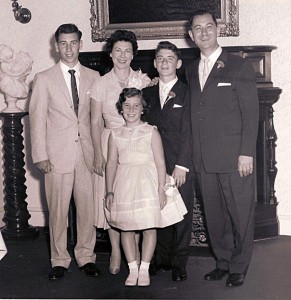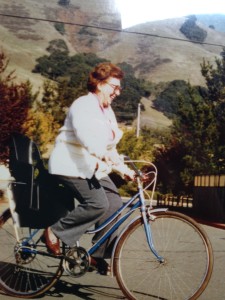
As we were in 1959
Today I interviewed Rachel Simmons for my podcast series: Family Confidential: Secrets of Successful Parenting. (No, it’s not posted yet. Gimme a week or two, ok?) We talked about her must-read new book The Curse of the Good Girl: Raising Authentic Girls with Courage and Confidence and about emotional intelligence. For me, EI (aka EQ) is the ability to:
- identify what you’re feeling
- accept the emotion as it is (without editorializing about your right to feel it)
- express emotion in responsible ways to people who need to hear what you have to say
I’ve immersed myself in this stuff for decades and love talking with people like Rachel, who’ve also made EI their life’s work.
After the interview I recalled a 2003 keynote speech I delivered in Los Angeles. The title: Why 21st Century Kids Need 21st Century Parenting. This feels as good a time as any for a revisit. Here’s a excerpt:
Before we were parents we had parents. People who showed us what it took to be a mom and a dad.
I woke up one morning when I was 5 and heard my mother sobbing behind the door of her room, my father comforting her. My brothers told me that Grandpa had died. A while later, Mom emerged, hair freshly brushed, lipstick bright red. She cheerfully asked what I wanted for breakfast. I wasn’t hungry, I was confused. I wanted to ask about Grandpa, but Mom’s tight smile warned me not to say anything that might upset her. While I pushed a piece of French toast around my plate I had a realization–an absolute epiphany: To be a grown-up means that you have to hide your sadness!
When I was 15 my father died suddenly of a heart attack. His passing left a huge hole in my heart, but instead of grieving I did what I thought grown-ups do, I suppressed my sadness.
Fast-forward 25 years. I’m in the dentist’s chair getting a replacement for an old childhood filling. The doctor pauses in the procedure, gently rests a hand on my head and asks how I’m doing. At his touch a tidal wave of sadness overwhelms me and I start weeping. For the next 48 hours I’m emotionally numb and clueless about what the hell is happening.
David helped me realize that the dentist’s touch had reminded me of my father, who often tousled my hair. With that revelation, the floodgates burst… finally I was able to grieve for my dad. And through my expression of loss I released myself from feelings which held me hostage for decades.
That day I learned about the power of unexpressed emotions. They don’t actually ever go away. Instead, they work like a mild acid, slowly eroding your insides, boring holes in your emotional foundation, creating gaps in your ability to connect with others. I decided not to ever bury feelings that need to be expressed. I vowed to teach my children, through my own example, to express their emotions in healthy ways.
I got my chance soon enough. During most of 1994 my mom was dying of Lou Gehrig’s Disease. Every day I drove an hour each way to visit her. During endless games of Scrabble we finally found the words to communicate with an intimacy we’d never shared before. I am eternally grateful for those last 10 months we had together… grace-filled and excruciatingly painful as they were.
After spending the day with Mom I’d arrive home each night to my own family, scared, stressed, worn down and so raw. I offered no one a lipstick smile. Instead, I trusted that our daughter and son (then ages 15 and 9) would know how to respond to a person in need. And they did. Their backrubs, cups of tea and loving words of encouragement got me through that endless year. I don’t know how I’d have coped if not for David and our sweet kids. If I’d chosen to play the game of “Everything’s fine, honey” I’d have betrayed myself and robbed my children of an opportunity to learn what it means to be a real human being. By sharing the truth of my emotional experience I gave them the chance to exercise their compassion (toward me and their grandmother) and to grow beautifully toward adulthood.
For years we’re on the receiving end of our parents’ choices, observing closely everything they do. As little children we accept that they knew best about what we need. As teens we wonder if they’ve got a clue about who we were or how to parent. After all that watching and evaluating and on the job training with kids of our own, at this point, what could we possibly not know about being a parent?
We know it all, right?













